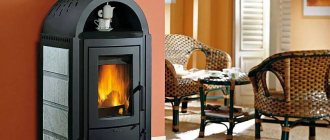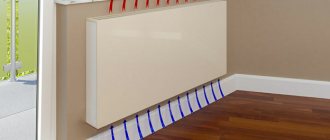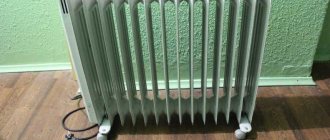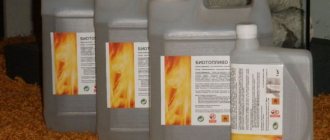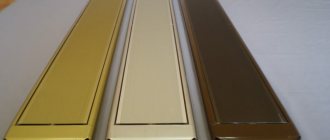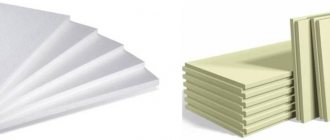If the central heating system is not operating efficiently, or even if it is absent, a comfortable temperature regime can be created in a closed room. Without fire, without gas, without firewood and chimney - only with electricity.
The heating equipment market offers a huge selection of electric heaters that can be used as the main or additional heat source. These are oil radiators, convectors, fan heaters, infrared heaters of various designs. In this list, the most understandable and familiar to users are oil radiators, similar to ordinary radiators. They will be discussed in our article.
Oil radiators were the first mobile heaters that began to be used en masse in our country. And they are still very popular. If you're looking for a portable heater that's easy to use, efficient, and affordable, we recommend investing in an oil cooler. This is a reliable method of room heating, proven by time and the experience of thousands of users.
What is an oil cooler and how does it work?
Externally, an oil radiator looks like a sectional radiator on wheels. Its body consists of several metal sections. It is filled with special mineral oil and equipped with an electric heating element. When you plug in the device, the heating element begins to heat the oil inside the radiator to the desired temperature. The sections heat up from the oil. And their heated surface warms up the air in the room. Warm air, according to the law of physics, rises and gradually fills all the air space in the room. The room becomes warm and comfortable, just as you wanted.
For safety and rational energy consumption, all oil heaters are equipped with built-in thermostats. The thermostat controls the heating temperature of the oil and turns off the device when it reaches the desired value. When the oil temperature drops, the heater turns on automatically. This principle of operation eliminates overheating of the device, keeps the temperature in the room at a comfortable level and allows you to save energy.
Where can an oil heater be used?
Most often, oil radiators are used as an additional and backup heating device. It will come to the rescue during the off-season - autumn and spring, when the central heating has not yet been turned on or has already been turned off. In case of emergencies related to the operation of the heating system, the radiator will save you again. If it is not warm enough for you in your own apartment, even with heating, you can buy an oil heater and turn it on when necessary.
An oil radiator can also be used for main heating. But only in small areas - in rooms, on glazed loggias and verandas, in small country houses, in closed trade kiosks.
Advantages of devices
This type of heaters is in demand in a variety of areas of operation, which can be explained by the following advantages:
- Optimized design. Small size, easy connection and minimal maintenance costs.
- Support for modern management tools.
- Energy efficiency. Taking into account the latest changes in design, we can say that these are the most economical heaters, if we take into account maintenance costs. Gas and water equipment requires less investment in the main resource of consumption, but due to the more complex technical organization in the complex, it is more expensive.
- Environmentally friendly. Again, minimal harm when used at home - the device does not emit any toxic substances or fumes and dust.
- Attractive exterior design. Manufacturers diversify models, including through the original implementation of color texture and structural forms.
What's good about an oil cooler?
Mobility. An oil radiator is a mobile heater. It can be easily moved from room to room, taken to a dacha or country house, or installed at a workplace.
Long service life. Due to their simple design, oil radiators practically do not fail and do not require any maintenance. Modern oil heaters are designed for long-term operation (up to three days of continuous operation) and are equipped with reliable, durable operating components.
Simple controls. Control of functions is limited to connecting the device to the network and selecting the desired temperature mode. The further operation of the heater will be controlled by a thermostat.
They don't dry out the air. The oil radiator heats the air mass gradually, gently and evenly. The relative humidity in a room with an oil heater will not fall below normal.
Low noise level. In heating mode without ventilation, the oil heater operates absolutely silently. Even if you activate the ventilation function, the noise level will not be so significant as to cause inconvenience to people in the room.
No smell. When you turn on the heater with an open heating element, an unpleasant burning smell often appears. This burns dust, which somehow settles on the heating element. The oil radiator has a hidden heating element. It is enough to wipe the surface of the radiator sections and the spaces between them from dust from time to time. There will be no dust, and there will be no burning smell.
Affordable price. The range of oil radiators consists of quite budget models with affordable prices. Almost everyone today can afford to buy an oil heater without a significant blow to the family budget.
Review of the best models
Many domestic and foreign companies are engaged in the production of oil heaters. The most popular products are from DeLonghi (Italy), Bimtek (Germany) and General Climate (Holland). This fact does not mean that the products of other manufacturers are bad.
The companies listed simply are the best on the world market today. Tomorrow the situation may change.
If we talk about the domestic market, we invite you to familiarize yourself with the best models of oil radiators presented in different price categories.
Image gallery
Photo from
Polaris brand oil heaters
Economical operation of oil heaters
Adjusting the operating modes of the device
Convenient options for mobile radiators
Selection criteria for comparison
To compare heating devices with each other, we chose the following characteristics:
- power;
- safety and reliability in operation;
- body parameters;
- presence of additional functions.
We have already talked about power and additional functions above and will not repeat ourselves. Let's talk about the reliability and safety of products.
Since products entering the domestic market are manufactured in China, albeit under license from European countries, you should not pay attention to the country of origin indicated in advertising brochures
The domestic market is filled with products made in China. There are, of course, models made together. In addition, Chinese production is most often carried out on the basis of licenses granted by European companies. However, these facts do not in any way affect the quality of what is on our shelves.
Therefore, we will exclude the argument in the form of the name of the manufacturer from the concept of “reliability”, and will focus our attention on functions that can increase the safety of using the product in a home or apartment.
As for the parameters of the model’s body, this indicator is of great importance. After all, the temperature of its heating depends on the size of the device. If you compare two radiators with the same power, make sure that the smaller one heats up first.
But once heated, a larger surface area remains hot longer. Therefore, the buyer himself will have to evaluate this parameter based on the goals he planned to achieve.
The best inexpensive models
The models were selected based on customer reviews from among inexpensive models, the price of which is in the range of 2300 - 2600 rubles.
This is an inexpensive, but very high-quality oil heater SUPRA ORS-07-SN, which deserves first place in the group of affordable devices: it is compact, has all the necessary functions and is easy to use
The list of leaders in terms of demand is headed by:
- SUPRA ORS-07-SN . This is a small device that does its job well and is not burdened with any unnecessary functions. However, it has everything you need: a regulator, a power indicator light, wheels and a cord compartment. SUPRA ORS-07-SN is protected from overheating. This model has no significant disadvantages.
- Hyundai H-HO1-05-UI550 . This model is designed to work in a room whose size does not exceed 14 m2. It can act as additional heating or can be used for local heating, located, for example, next to the owner’s workplace. The advantage of the Hyundai H-HO1-05-UI550 is its low weight (5 kg), as well as the presence of protection against overheating and frost.
- Timberk TOR 21.1005 SLX. The device has a power of 1.8 kW, but, based on the passport data, is capable of heating a room measuring 24 m2. The heater is equipped with electronic control and has a fireplace effect. The disadvantages include the strong heating of the case, the surface of which can even get burned.
With proper use, models proven in practice will last as long as the manufacturers promised.
Average price category
If you are ready to spend a little more money on organizing a comfortable environment in your home, you can consider several models from the middle price category, in which the cost varies from 3,400 to 3,500 rubles.
If you wanted to get a model with an attractive design, then Resanta-OM-7NV is exactly what you should be interested in
List of the most popular representatives of the mid-price segment:
- Resanta-OM-7NV. This model will delight aesthetes with its attractive appearance: the gray-blue body of the device is equipped with bright elements. With a power of 1.9 kW, it quickly heats the room thanks to the built-in fan. The advantages include the reliability of this product.
- Polaris PRE M 0920. When you turn it on for the first time, you may notice a slight smell of plastic, which will disappear as you continue to use the heater. The device has three operating modes, and it heats so well that you will only need maximum heating when frost sets in or when the heating is completely turned off.
- General Climate NY23LA. Let's say right away that there is no timer in the design of the device. This is his only drawback. Now let's move on to the advantages. This product with a durable body is equipped with two heating elements.
The outermost heater described can be used to operate in conditions of initial sub-zero temperatures, due to the presence of a frost protection function in it. If you run it in automatic mode, it will maintain a room temperature of +5ºС.
Expensive devices with additional functions
If your finances allow you to buy whatever you want, you can purchase one of the expensive miracle devices (price from 3,700 rubles and above), which, in addition to heating, will delight you with its additional capabilities.
The Electrolux EOH/M-1221 model is the very exception to the general rules that we talked about above: it has unique properties, thanks to which it can work in conditions of high humidity
The ranks of elite equipment are headed by:
- Electrolux EOH/M-4209. This device will quickly heat up your room thanks to the fireplace effect. This is the name for increased traction, which is created thanks to special slots located in the radiator housing. The heater is equipped with a compartment for the cord, does not emit odors, and turns off when overheated.
- Rolsen ROH-D9. This model has only seven sections, but with the help of a built-in fan it will quickly heat a room up to 20 m2. It is advisable to use it for additional heating of premises in apartment buildings.
- Electrolux EOH/M-1221 . Although this model does not have a timer, its advantages are great: it can be safely used in rooms with high humidity. If you buy this device, you will never have to take a bath in a cold room.
Let's take a closer look at the third model. If the radiator is accidentally knocked over, the device will immediately turn off.
It is protected from overheating, has a fireplace effect and is equipped with wheels that can rotate in different directions.
What are the disadvantages of oil radiators?
Slow heating. Heating a room with an oil radiator occurs according to the following principle: first the heating element is heated, then the mineral oil inside, then the heater body and only then the air in the room. This process takes time. It will take about an hour for the room to warm up to a comfortable temperature. With the ventilation mode, the result can be felt faster.
Power limitation. There are no high-power oil radiators. The power of a household oil heater does not exceed 2.5 kW. This type of electric heaters is only suitable for serving small spaces (maximum 25 square meters).
Heavy weight. An oil-filled heater is not lightweight. But all models have a wheelbase - you can simply roll it from room to room on wheels. It is not easy to carry it in your hands, but it is also quite possible.
Heating of the case. The surface of the oil cooler housing heats up. It is necessary to exclude the possibility of contact of the surface of a working heater with open areas of the human body in order to avoid thermal injuries. Drying clothes on an oil radiator is prohibited due to fire safety rules (the exception is models with a special mode for drying clothes).
Installation Rules
- The optimal distance from the radiator to the outlet is no more than 30 cm.
- The socket should be located on the side or below the device body and in no case higher.
- There should be no obstacles or furnishings closer than 30 cm on all sides of the radiator.
- The panel should be 3-5 cm away from the wall in accordance with the manufacturer’s requirements, which must be specified in the instructions.
- Do not use an oil radiator to dry clothes or any objects. It must not be covered with a cloth or interfere with heat transfer in any way.
- It is better to supply power for a stationary heater to a separate circuit breaker in the distribution panel or to a group of fuses when using several heaters throughout the house.
It is best to install the radiator in the place of the greatest heat loss, under the window opening. Naturally, with the condition that the radiator will not be covered with heavy tulle or curtains. Otherwise, it is better to place the heater on a wall bordering the street so that nothing interferes with heat exchange.
How to calculate the required power of an oil cooler?
Before buying an oil heater, measure the area of the room and the height of the ceilings. Using the simplest formula, the required power is determined as follows: 1 kW of power per 10 square meters of room area with a standard ceiling height of 2.75 m. To calculate the required power more accurately, you need to take into account the quality of thermal insulation of the walls, the number and size of windows, floor, availability drafts and other factors that may reduce the efficiency of the device.
An oil cooler that is too powerful will consume a lot of electricity, which will entail unnecessary costs. A device with insufficient power simply will not be able to heat the room to a comfortable temperature. Therefore, it is necessary to take the power calculation seriously and provide for some reserve (10-15%).
Recommendations when choosing
- It is best to give preference to the model that has wheels and handles. This will make it easier to move the device as needed;
- A good oil heater has an impressive weight. Light weight indicates thin walls or insufficient oil. Both options lead to premature failure;
- If there is a small child in the house, then a special casing is put on the device, which will protect against burns;
- The length of the cord also plays an important role. If the cord is too short, you will have to use an extension cord, which will not always be able to withstand the voltage and will eventually begin to melt, which will lead to a short circuit, and subsequently to a fire;
- It is undesirable to listen to the recommendations of consultants, since for their own benefit they can sell less popular products, guided by false arguments (“black transfers heat better” or “this” option does not raise dust”, and so on).
Watch a video on how to choose an oil heater
How many sections should an oil cooler have?
The oil cooler can have from 3 to 14 sections. The more sections, the larger the heating surface. And the more powerful the heating element of the heater. Which model should you choose? Depends, again, on the area of the room. To heat large rooms you will need a massive, more powerful radiator. In a very small room you can install a mini-radiator with 4-5 sections. The most popular are medium-sized heaters with 7-9 sections. These are the models that are purchased for heating standard rooms in residential buildings and apartments.
Kinds
Depending on the design, there are ribbed and flat radiators.
Flat
Otherwise, they are also called panel ones because of their appearance. This is a one-piece radiator with recesses and bulges on the panels to increase the overall surface, and therefore heat transfer. They heat the room worse than finned ones, but have a higher efficiency, that is, the consumed electricity is spent more efficiently. It is this quality that makes them more popular. Still, saving energy is of great importance. They are also lightweight and less bulky in size.
Ribbed
The ribbed ones consist of separate segments and look like regular batteries. They have a large surface area, due to which they transfer heat as efficiently as possible. On the other hand, this design has greater weight and dimensions. This type of radiator is more often used for heating large areas.
What systems provide security?
Overheat protection All oil radiators without exception are equipped with an overheat protection system. If the heating temperature exceeds the permissible temperature, the temperature sensor will operate and the device will automatically turn off. There is no need to monitor the operation of the heater every minute. You can safely leave it on overnight. But manufacturers do not recommend leaving a working device unattended for more than 24 hours.
Rollover protection. The oil cooler can only be operated in a vertical position. This is due to the peculiarities of its design and the operation of the heating element in oil. It is strictly prohibited to place the device on its side or tilt it. Almost all modern models of oil heaters are equipped with a vertical deviation sensor. This sensor will turn off the device if it is incorrectly installed or accidentally tipped over.
